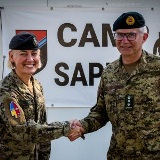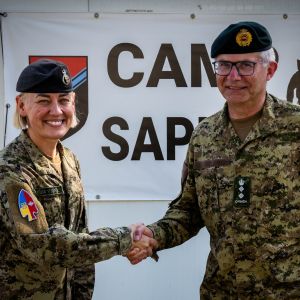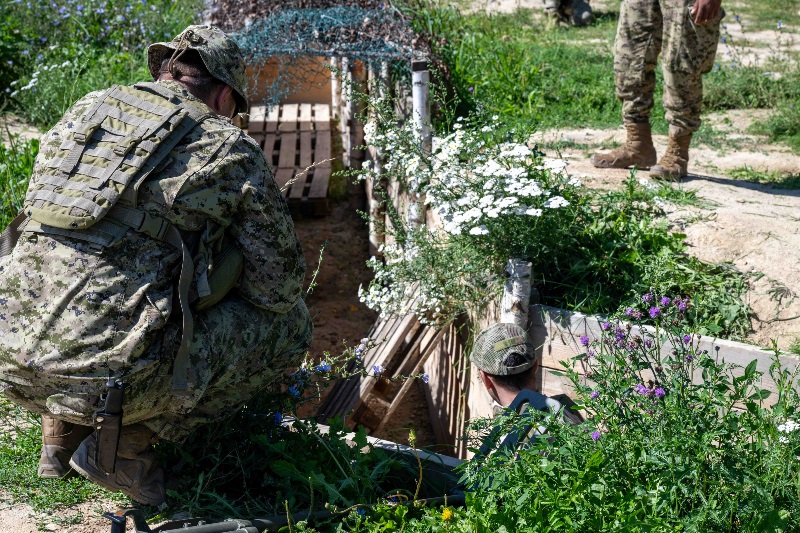A Mission to Remember—How Canadian Military Engineers are Building a Better Future in Ukraine

 All engineers face pressure. But there’s no pressure like building a bridge on a battlefield filled with bombs. “The biggest difference between civilian and military engineering is the pace,” says Lt.-Col. Chelsea Braybrook, P.Eng. “Whether we're building a bunker or a bridge under combat, the conditions can mean life or death.”
All engineers face pressure. But there’s no pressure like building a bridge on a battlefield filled with bombs. “The biggest difference between civilian and military engineering is the pace,” says Lt.-Col. Chelsea Braybrook, P.Eng. “Whether we're building a bunker or a bridge under combat, the conditions can mean life or death.”
Braybrook, a proud APEGA registrant and military infantry officer, is currently stationed overseas commanding Operation UNIFIER, the Canadian Armed Forces’ military training and capacity-building mission in support of Ukraine. It launched in 2015, at the request of the Ukrainian government following the illegal annexation of Crimea, and it ramped up in early 2022 after Russia’s unprovoked full-scale invasion. On this mission, the lieutenant-colonel oversees the training of Ukrainian military engineers to breach defensive lines, clear mines, and disarm booby traps while “under force protection to achieve their tasks and be survivable themselves.”
Now a member of Princess Patricia’s Canadian Light Infantry, and an APEGA licensed professional since 2014, Braybrook joined the reserves full time in 2009. Back then, she knew APEGA Registrar and CEO Paul Wynnyk, P.Eng., as “general.”
Early life
Braybrook and her younger brother grew up in Sarnia, Ont., and although her two navy grandparents (on her father’s side) brought a strong military influence to the family, she never felt pressured to serve—or do anything she didn’t love.
“My parents were super supportive. If I wanted to be Cher, we’d get a costume and I’d sing. If I wanted my Barbie dolls to wear fatigues, that was okay too.”
But living-room lip-synch performances turned into kitchen-table lab experiments that “wrecked my mom’s kitchenware.” And it soon became clear that Braybrook and her engineer father shared similarly STEM-inclined minds. “Any time we went out to do anything, he would have a prepared list of math questions that were my threshold to entry to dinner or the movies—and I loved it.”
On a mission
Braybrook also loves fulfilling a mission, whether that’s finishing her basement, submitting her professional requirements with APEGA, or completing tours of duty in Afghanistan and the Middle East. She’s halfway through her first six-month deployment for Operation UNIFIER, which across its decade of operation has trained more than 46,000 members of the Security Forces of Ukraine, including 12,000 since the full-scale invasion. Braybrook trains basic recruits and senior “sappers” (the term for frontline engineers from the French word for “trench”), and says she’s “incredibly proud” of the Canadian government and the goal it shares with its NATO and EU allies: “anything we can do to enable the Ukrainians’ survivability and lethality, because they’re in a war for their existence.”

Looking back at her career, Braybrook takes equal pride in her infantry and engineering work, regardless of life-or-death stakes, and thinks people need the same skills to succeed in both. “As Commander of Operation UNIFIER, I am leading a team of several hundred people, and there is a lot of overlap with annual APEGA professional requirements, such as managing large-scale technical projects involving infrastructure,” she explains. And she says her former general, APEGA RCEO Paul Wynnyk—whom she recently caught up with while on a tour of duty—embodies those skills. “Paul is a highly trained, highly ethical leader who formally served as Commander of the Canadian Army… and I feel he brings a special level of trust and authority with exceptional skills to APEGA.”
She also sees an overlap in challenges women face in the engineering and military worlds and applauds APEGA’s work to investigate and remove barriers. “The reality is that women in the Forces are underrepresented in many occupations and recruiting and retention challenges persist. But women bring diverse perspectives and enhance operational effectiveness through innovative problem-solving skills, inclusive leadership, and collaborative approaches. I’m thankful to have had excellent colleagues, from many diverse groups, as an APEGA member and an officer in the Canadian Armed Forces.”
Reflecting on sacrifices—past and current
Growing up, Braybrook saw her navy grandparents as living reminders of the Second World War, and she’ll never forget the close friends she lost on her own past tours. None of that history escapes her as she watches Ukrainians defend their sovereignty from an expansionist regime.
“The sacrifices of the Ukrainian people are incredible, and the job we are here to do is real,” she says. “And there is, across the task force, an air of seriousness as we approach Remembrance Day. For me personally, I will be visiting Juno Beach on Remembrance Day, with my father. It’s something I’ve always wanted to do, and it is important to me to reflect on the past and honour that national sacrifice.”
